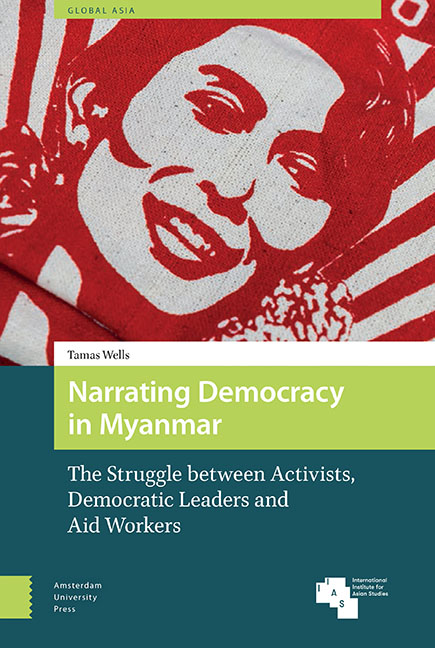Book contents
- Frontmatter
- Contents
- Abbreviations
- Acknowledgements
- Foreword
- 1 Introduction
- 2 Elucidating the Meaning of Democracy through Narrative
- 3 Toward the ‘Ocean of Democracy’?: The British Colonial Administration, the Thakin and Contests over Meanings of Democracy in late Colonial Burma
- 4 Burma after Independence: From Moral to ‘Disciplined’ Democracy
- 5 A liberal Narrative
- 6 A benevolence Narrative
- 7 An Equality Narrative
- 8 Exposing the Political use of Narratives
- 9 Beyond an ‘Ideal type’
- 10 Playing Different Games: Myanmar’s Future Challenges
- Index
10 - Playing Different Games: Myanmar’s Future Challenges
Published online by Cambridge University Press: 17 June 2021
- Frontmatter
- Contents
- Abbreviations
- Acknowledgements
- Foreword
- 1 Introduction
- 2 Elucidating the Meaning of Democracy through Narrative
- 3 Toward the ‘Ocean of Democracy’?: The British Colonial Administration, the Thakin and Contests over Meanings of Democracy in late Colonial Burma
- 4 Burma after Independence: From Moral to ‘Disciplined’ Democracy
- 5 A liberal Narrative
- 6 A benevolence Narrative
- 7 An Equality Narrative
- 8 Exposing the Political use of Narratives
- 9 Beyond an ‘Ideal type’
- 10 Playing Different Games: Myanmar’s Future Challenges
- Index
Summary
Abstract
Drawing on this history of conceptual contests over democracy in Myanmar, this chapter looks forward to how contests over the meaning of democracy might shape areas of political decision-making and policy in Myanmar over the coming decade. How might the particular examples of narratives, and their political use – within activist networks, the NLD and aid agencies – apply to the future of Myanmar's politics? What challenges might there be for activists, democratic leaders and aid agencies through future contests over the meaning of democracy?
Keywords: Myanmar, elections, benevolence, National League for Democracy, Aung San Suu Kyi
I began this book with reflections on the historic election victory of the NLD, which catapulted the long suffering NLD party, and Aung San Suu Kyi, into power. Much of the rest of this book has been oriented to look back from that pivotal moment in 2015 – to the transition after 2010, to the decades of authoritarian rule, and then even further back to the independence era and the late colonial period in Burma. Drawing on this history of conceptual contests over democracy, in this chapter, I now look forward to how contests over the meaning of democracy might shape areas of political decision-making and policy in Myanmar over the coming decade. How might the particular examples of narratives, and their political use, that I have described within activist networks, the NLD and aid agencies apply to the future of Myanmar's politics? What challenges might there be for activists, democratic leaders and aid agencies through future contests over the meaning of democracy?
Since the 2015 elections there have been many attempts to identify the core future challenges that Myanmar faces – related to political leadership (Blaževič 2016; Barany 2018; Roman & Holliday 2018), Muslim minorities and citizenship (Kosem & Saleem 2016; Win & Kean 2017; Ahsan 2018; Mukherjee 2019), ethnic conflict and peace (Dukalskis 2017; Ganesan 2017; South 2018; Wilson 2018) and ongoing military influence in politics and the economy (Huang 2017; Selth 2018). Most analysts implicitly or explicitly ask, as Roman and Holliday (2018) do, ‘What are the prospects for liberal democracy in Myanmar?’ Some authors are hopeful of movement toward liberal democracy (Blaževič 2016), or at least ‘cautiously optimistic’ (Steinberg 2015).
- Type
- Chapter
- Information
- Narrating Democracy in MyanmarThe Struggle Between Activists, Democratic Leaders and Aid Workers, pp. 199 - 210Publisher: Amsterdam University PressPrint publication year: 2021

